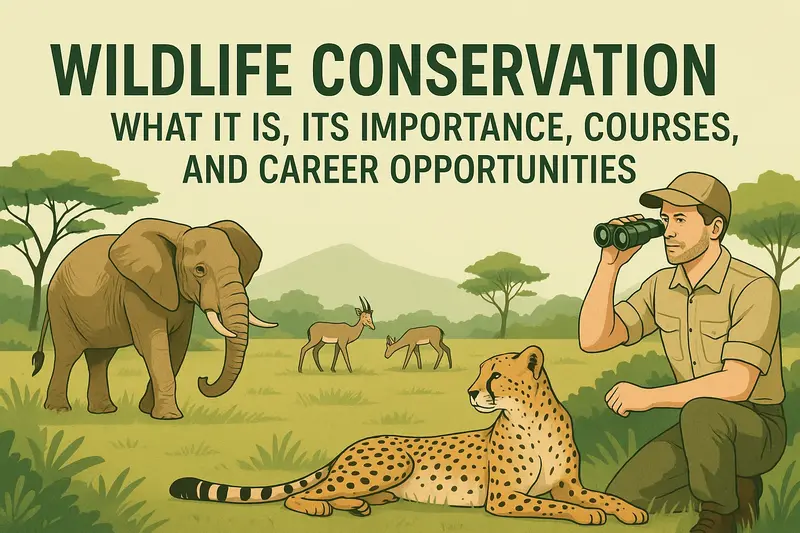Wildlife conservation is a critical element for maintaining the planet’s ecological balance. Protecting animal species in their natural habitats helps preserve biodiversity and promotes human well-being. If you are passionate about animals and want to take part in securing the survival of species, this article will guide you through what wildlife conservation is, why it matters, how to study it, and what professional opportunities it offers.

Wildlife conservation refers to a broad set of strategies and actions aimed at protecting, preserving, and sustaining animal populations in their natural environments. These measures include preventing extinction, promoting breeding, and ensuring sustainable coexistence between wildlife and human activity.
Effective conservation requires professionals dedicated to scientific research, environmental education, and regulatory policy that governs human impact on animals and their ecosystems.
Wildlife conservation plays a vital role in ecological and human systems. Here are some reasons why it's essential:
Preserving biodiversity: Every species plays a specific role in the ecosystem; the loss of one can destabilize the entire system.
Regulating climate and ecological functions: Many animals are directly involved in essential ecological processes such as pollination, seed dispersal, and nutrient cycling.
Economic and cultural value: Wildlife supports ecotourism, scientific research, and cultural traditions in many communities.
Safeguarding human health: Helps prevent zoonotic diseases (diseases transmitted from animals to humans) and ensures a clean, stable environment.
If you want to gain formal training in this field, programs such as the Wildlife Conservation Course offered by MasterD can be an excellent starting point. This comprehensive program covers:
Ecology and biodiversity
Wildlife conservation and management strategies
Threats to wild animals
Environmental protection laws and policies
The course also includes practical training in wildlife rescue centers and recovery projects, allowing students to gain hands-on experience and insight into real-world conservation efforts.
With proper training, you can pursue a wide range of meaningful roles, such as:
Environmental education and outreach: Raise awareness and promote conservation through teaching and community programs;
NGOs and environmental organizations: Join conservation projects focused on species protection and habitat restoration;
Wildlife rehabilitation centers and zoos: Participate in animal recovery, care, or captive breeding programs;
Public administration and national parks: Help manage protected areas, enforce laws, and develop conservation policies;
Scientific research: Conduct studies on endangered species and their ecological roles.
If your passion lies with animals and you want to be a part of the global effort to protect them, specializing in wildlife conservation is a powerful and rewarding path.
animal tags: Protecting Wildlife
We created this article in conjunction with AI technology, then made sure it was fact-checked and edited by a Animals Top editor.